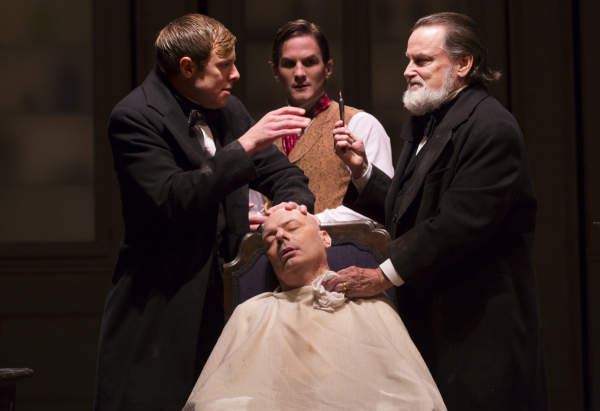Playwright Elizabeth Egloff Takes Boston Audiences Into the Ether Dome
Modern health-care corruption finds its roots in a 19th-century dentist’s chair.
After nearly a decade of development, playwright Elizabeth Egloff can hardly remember where her history play Ether Dome began. "People say to me that it's a completely different script," she says. "But I can't tell. I'm not objective."
Egloff received a commission from director Michael Wilson back in 2005 for a play surrounding a historic event that took place in her home state of Connecticut. Nearly ten years later, the play has made its way to Boston's Huntington Theatre Company, where Wilson directs a coproduction with Alley Theatre, Hartford Stage, and La Jolla Playhouse.
As the play passes through its many incarnations, Egloff has enjoyed her ride through the rabbit hole of medical and historical research concerning the discovery of ether as an anesthetic in the mid-19th century — a development that was initiated by dentist Horace Wells in Hartford, Connecticut, in 1846. Rightful credit for the momentous scientific development, however, remains unknown to this very day, offering a story rife with scandal, betrayal, and consequences that remain at the forefront of today's biggest questions of medical ethics.

Has it been a challenge to shape this piece of history into a concise story?
When it started out it was a story about two men: this teacher and this student. It pretty quickly became a story about four men. I wanted to do justice to each of them because, in a sense, it's a Rashomon story. Nobody to this day has ever been able to figure out who really should get the credit for it. Everybody has their own understanding of what happened, and each one of those four men believes fervently that they have been ripped off by the other.
Did you ever think you would spend so much time investigating the history of dentistry in the 1800s?
God no! [laughs] I would never have thought. But then the research became really fascinating. It kept leading into other lurid stories about things that other doctors had done. There was a lot of great gossipy story material. Finally I had to just focus it on the teacher and the student, but there are other stories that are almost as important.
Much of the corruption you touch upon in the play has strong connections to the state of the health-care system today. Do you want those themes to resonate with your audiences?
Yes. Before 1846, Hippocrates was a much greater part of a doctor's identity. The oath that you take is to be poor. You have to be poor in order to understand what's making your patients sick, and therefore, to be able to cure them. The idea of making people pay to be not in screaming agony — or even die of agony — was shocking. After 1846, this is really left behind. It's wildly unethical what is happening today. Pharmaceutical companies can now sit on a drug for years and then charge ten times what it cost to research and develop that drug. They always say that they have to jack up their rates to pay for the research and development of other drugs, but drugs are almost always researched and developed by universities. The university is the one who pays for it. For the pharmaceutical company to say that they're trying to make back that investment money is patently untrue. It's not a piece of agitprop theater, but I do hope that audiences will make the connection. And many of them seem to have made it. [Audiences] end up coming out of the theater arguing about who really deserved the credit, but everybody tends to feel the same way about the way new drugs are jacked up in price.
Do you have your own opinion about who deserves the credit for this medical innovation?
The brutal truth is the guy who deserves the credit is the guy who actually did it. But he ripped off two other doctors in order to do it and gave them no credit. It was highly unethical. The question is, do ethics have anything to do with scientific credit? It's a very uneasy relationship — even now.

(© T. Charles Erickson)










